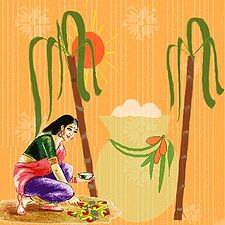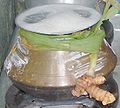- Thai Pongal
-
For the dish, see Pongal (dish).
Thai Pongal 
Observed by Tamils Type Festival, Tamilnadu, India, Northern Province, Sri Lanka, Sri Lanka Significance Harvest festival. Thanking the sun god for agricultural abundance Date First day of the tenth month of Thai in the Tamil calendar 2011 date 15 January Celebrations Feasting, gift-giving, visiting homes Thai Ponggal (Tamil: தப்பொங்கல்) is a harvest festival celebrated by Tamils in the Indian state of Tamil Nadu, Indian Union Territory of Puducherry and in Sri Lanka. Pongal coincides with the festival Makara Sankranthi celebrated throughout India. Pongal in Tamil means "boiling over" or "spill over". The boiling over of milk in the clay pot symbolizes material abundance for the household. Thai Pongal, celebrated at harvest time, is traditionally intended to thank the Sun God and farmstead livestock that helped create the material abundance.
The saying "Thai Pirandhal Vazhi Pirakkum" (தை பிறந்தால் வழி பிறக்கும்) meaning "the commencement of Thai paves the way for new opportunities" is often quoted regarding the Pongal festival[1] The festival usually occurs from January 13 — 15 in the Gregorian calendar i.e. the last day of the Tamil month Maargazhi to the third day of Thai.
Ponggal is traditionally dedicated to the Sun God Surya. Tamils thank the solar deity for the good harvest and consecrate the first grain to him on this 'Surya Mangalyam'.
The holiday denotes the start of the Tamil month of Thai (தை). It marks the day when the Sun purportedly shifts northwards. It signifies the commencement of Uttarayana, which represents the northward journey of Sun. The days get longer in the Tamil lands. Thai Ponggal falls on Makara Sankranthi celebrated throughout India as the winter harvest. This also represents the Indic solstice when the sun purportedly enters the 10th house of the Indian zodiac i.e. Makaram or Capricorn.
Contents
History
The history may well be more than 1000 years old although some are of the view that the festival is older. Epigraphic evidence suggests the celebration of the Puthiyeedu during the Medieval Chola empire days. It is thought that Puthiyeedu meant the first harvest of the year.[2] The Sangam era literary work, the Paripaadal, refers to a fast by unmarried girls in honor of the God Vishnu in the month of Thai, known as the Thai Nonbu. The link between that fast and today's harvest festival needs to be further researched. Tamils refer to Pongal as "Tamizhar Thirunaal" (meaning "the festival of Tamils")[3] Makara Sankranti in turn is referred to in the Surya Siddhanta.
Bhogi
Bhogi Pandigai / Bhogi Pandaga / Lohri / போகிப்பண்டிைக / போகிப் பள்ளு / லோஹ்ரி
The day preceding Ponggal is called Bhogi when people discard old things and focus on new belongings (பைழயன கழிதலும் புதியன புகுதலும்). The disposal of derelict things is similar to Holika in North India. The people assemble at dawn in Tamil Nadu and Andhra to light a bonfire to discard old used possessions. The house is cleaned, painted and decorated to give a festive look.
This tradition is observed on the same day in Andhra Pradesh where it is also called "Bhogi." The fruits from the harvest are collected (such as regi pallu and sugar cane), along with flowers of the season, in a ceremony called Bhogi Pallu Money is often placed into a mixture of Bhogi Pallu, and the mixture is poured over children, who then collect the money and sweet fruits.
This day is celebrated in Punjab as Lohri and in Assam as Magh Bihu / Bhogali Bihu.
Thai Pongal
Pongal Pandigai பொங்கல் பண்டிைக
Ponggal itself falls on the first day of the Tamil month of Thai (January 14 or 15). It is celebrated by boiling rice with fresh milk and jaggery in new clay pots. The rice is later topped with brown sugar, ghee, cashew nuts and raisins. This tradition gives Pongal its name.[1]
 Kolam decorations in front of house during Thai Ponggal
Kolam decorations in front of house during Thai Ponggal
The rice is traditionally cooked at sun rise.
The moment the milk boils over and bubbles out of the vessel, the tradition is to shout of "Ponggalo Ponggal!", introduce freshly harvested rice grains in the pot and blow the sanggu (a conch). Tamils consider it a good sign to watch the milk boil over as it connotes good luck and prosperity. The newly cooked rice is traditionally offered to the Sun God at sunrise to demonstrate gratitude for the harvest. It is later served to the people present in the house for the ceremony. People prepare savories and sweets such as vadai, murukku, paayasam, visit each other and exchange greetings.
Tamil Nadu, Sri Lanka - celebrated as Thai Pongal Andhra Pradesh, Bengal, Kerela, Bihar, Goa, Karnataka, Orissa, Madhya Pradesh, Maharashtra, Manipur, Uttar Pradesh - celebrated as Makara Sankranthi or Sankranthi
Gujarat and Rajasthan celebrated as Uttarayana
Haryana, Himachal Pradesh and Punjab - celebrated as Lohri
Assam - celebrated as Magh Bihu or Bhogali Bihu
Nepal - celebrated as Maghe Sankranthi
Tamils draw kolams/rangolis on the door step, consume sugar cane, prepare sweetened rice, milk and jaggery in new earthen pots and dedicate it to Sun God. The family elders present gifts to the young. Elsewhere in India, there is kite flying in Gujarat and Andhra, the Jahangir Dance in Punjab and the Ganga Sagar Mela in Bengal. Millions of people immerse themselves in rivers in North India and offer prayers to the Sun God - Suryan. People offer thousands of their colorful oblations to the Sun in the form of beautiful kites.
The Sun stands for “Pratyaksha Brahman” - the manifest God, who symbolizes the one, non-dual, self-effulgent, glorious divinity blessing one and all tirelessly. The Sun is the one who transcends time and also the one who rotates the proverbial wheel of time.
Maattu Ponggal
Main article: Mattu PongalMattu Ponggal / Kanu Pongal மாட்டுப்பொங்கல் / கனுப்பொங்கல்
Cattle play an important role in the traditional Indian farmstead be it with regards to the provision of dairy products, its use for ploughing and transport and its provision of fertilizer. This explains the Vedic reference to cattle as wealth. On the day after Ponggal, cattle are felicitated. In rural Tamil Nadu, adventurous games such as the Jallikkattu or taming the wild bull are features of the day. Maattu Ponngal is intended to demonstrate our recognition and affection to cattle and decorate them with garlands, apply kungumam (kumkum) on their foreheads and feed them good food.
Maattu ponggal & the famous Alanganallur Jallikattu
Maattu ponggal is intended to honor the cattle that worked hard throughout the year. The farm bulls are given a bath, their horns painted and adorned with new sarees in some places. In Alanganallur, bulls are set free in a ground where youth who hold on its hump until the victory line are considered victorious.In Alanganallur which is located 17 km Northwest of Madurai Jallikattu is conducted with enthusiasm.
Kanu pidi...........
Kanu Pidi (கனுப்பொங்கல்) is a tradition that the ladies and young girls of the house follow. Women feed birds and pray for the well being of their brothers. Women of the family place different kinds of coloured rice, cooked vegetables, banana and sweet ponggal on a ginger or turmeric leaf and invite the crows, which descend in hordes to share and enjoy the "Kaka pidi, Kanu pidi" feast. Women offer prayers in the hope that the brother-sister ties may remain forever strong like the family of crows.
"Kakkapidi Vaithen, Kanupidi vaithen, Kakkaiykkum Kurivikkum Kalyanam". "Kakkapidi vaithen, kanupidi vaithen, kakkaikootam pole engal koottamum kalayaamal irukkanum."
காக்கா பிடி வைத்தேன், கனு பிடி வைத்தேன், காக்காய்க்கும் குருவிக்கும் கல்யாணம் காக்கா பிடி வைத்தேன், கனு பிடி வைத்தேன், காக்காய்க்கூட்டம் போல எங்கள் கூட்டம் கலையாமல் இருக்கனும்.
Kaanum Ponggal
Kaanum Ponggalகாணும் பொங்கல்
This is a time for family reunions in Tamil Nadu. Brothers pay special tribute to their married sisters by giving gifts as affirmation of their filial love. Landlords present gifts of food, clothes and money to their workforce. During Kaanum Ponggal (the word kaanum means "to view"), people visit relatives and friends to enjoy the festive season. In the cities this day is synonymous with people flocking to beaches and theme parks to have a day out with their families. They also chew sugar cane and decorate their houses with kolam. This day is a day to thank relatives and friends for their support in the harvest. Although it started as a farmers festival, today it has become a national festival for all Tamils irrespective of their origins or even religion. It is as popular in urban areas as is in rural areas.
In Andhra Pradesh, Mukkanuma, the final day of Sankranthi festival, is celebrated to worship cattle. Mukkanuma is famous among the non-vegetarians of the society. People do not eat any non-vegetarian during the first three days of the festival and eat it only on the day of Mukkanuma.
Ponggal at Temple
Apart from Ponggal Day celebrations, cooking ponggal rice [ community pongal ] at Hindu temples is a traditional practice during any Temple Festival in Tamil Nadu. The community will convene to cook ponggal rice, partake of it and distribute it to those present. It would often include the sacrifice of a goat or rooster (animal sacrifice being a cultural practice only as it is forbidden in the Vedas) followed by the partaking of non-vegetarian food outside temple premises in certain areas. Only vegetarian food allowed inside temple premises.
-
D. M. Swaminathan at the Thai Pongal Festival at his temple in Colombo
-
An office in Tamil Nadu decorated for the festival of Thai Pongal
See also
Notes
- ^ a b "Thai Pongal". Daily News, Sri Lanka. http://www.dailynews.lk/2003/01/15/fea10.html.
- ^ "Thai Pongal". sangam.org. http://www.sangam.org/CULTURE/pongal.htm.
- ^ "Tamils festival". ntyo.org. http://www.ntyo.org/kolangal/thaipongal.htm.
References
- Saveri, Nicholapillai Maria (0001). Jaffna The Land of the Lute. Thirumarai Kalamanram Publications. pp. 125. ISBN 09681597-0-2.
Festivals in the Hindu calendar Major festivals - Pongal (Makar Sankranti)
- Holi
- Rama Navami
- Krishna Janmashtami
- Maha Shivaratri
- Onam
- Ganesh Chaturthi
- Navratri (Mysore Dasara – Durga Puja – Vijayadashami)
- Diwali (Bhau-Beej)
- Chhath
- Vat Purnima

Regional New Year - Gudi Padwa (Marathi, Konkani)
- Ugadi (Telugu, Kannada)
- Cheti Chand (Sindhi)
- Bihu (Assamese)
- Vaisakhi (Punjabi)
- Vishuva Sankranti (Oriya)
- Pohela Boishakh (Bengali)
- Puthandu (Tamil)
- Vishu (Malayalee)
Holy days Holy periods Categories:- Tamil festivals
- January observances
- Food festivals
- Festivals in Tamil Nadu
- Festivals in India
- Hindu festivals
Wikimedia Foundation. 2010.



